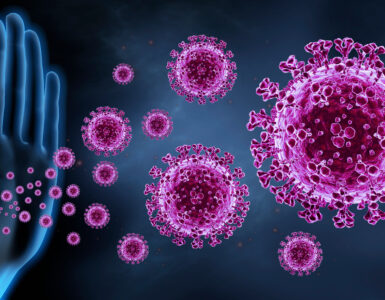By: Ragnheiður Alfreðsdóttir
A positive lifestyle does not only mean adding years to your life, but also adding life to your years. We want to enjoy the present and work towards enjoying mental, physical, social and financial well-being in the future. This requires us to take responsibility for the lifestyle we choose, work towards improving our own well-being and that of those around us and doing what we can to prevent future illnesses. You can, for instance, prevent about a third of all cancers by living a healthy lifestyle.
The time that it takes cancer to develop differs, but it usually takes many years, even decades. Today, a cancer might be developing that will cause symptoms, e.g. bleeding from the colon, in ten years’ time. Although cancer mostly affects the elderly, we should strive from a young age to prevent it from forming. No one is unaffected by it, as one-third of the population are diagnosed with cancer in their lifetime, and the rest have some connection to people diagnosed with the disease.
What is a healthy lifestyle? A healthy lifestyle includes being comfortable in your own skin and working toward being at peace with yourself and your actions, if you should shed this mortal coil today. It takes some work to live a healthy lifestyle, but it is work that should be easy and enjoyable.
- Do exercise that you find enjoyable – you can even combine exercise and socialising with your friends and family. You can walk or jog through city streets with the crew, go for bicycle rides with your family, play golf with your friends and take the stairs instead of waiting for the lift. Exercise has a positive effect on your physical shape, muscle strength and mental well-being, enables you to recover more quickly from setbacks, reduces anxiety and depression and increases general quality of life.
- Prioritise sleep and rest over staying needlessly awake in front of the television or computer. Limit caffeine intake (coffee, tea, colas and energy drinks), particularly in the hours prior to sleep. The half-life of caffeine is approximately five hours, which means that five hours after drinking coffee, half the caffeine is still in your body.
- Establish goals for your own ideal weight, achieve that weight and be at peace with that weight. Being overweight is a contributing factor to many diseases. The body tries to return to its former weight, so it can take up to two years to get used to the new weight. It will require dedicated willpower to maintain the new weight. One way is to reduce food portions. It takes approximately 15 minutes before you feel satiated, so put a single, smaller, moderate portion on your plate and wait to see if this portion is sufficient, and remember to have a good portion of vegetables, fruit and roughage and drink plenty of water.
- Be choosy about what you eat, and don’t treat your body like a dustbin. The food we eat over the day is supposed to help our bodies to renew themselves and provide fuel. Sweets do not provide any power; they just make the body heavier and can lead to diabetes, weak joints, tooth decay and discomfort. Be careful about storage and cooking methods, and avoid smoked, salted, burned and spoiled food.
- Enjoy eating food made from fresh ingredients and decrease consumption of processed foods. Take vitamin D, as this strengthens the immune system, provides protection against infections and has an effect on most of the body’s organ systems, helping them to function normally. Take omega-3 fatty acids, as these are believed to have beneficial effects on the immune system, mental health and eyesight and positive effects in combating various diseases.
- It is never too late to stop smoking. Not only does smoking cause lung cancer, but smoking is also like failing to rust-protect your car and then driving on salted roads all winter. Oral tobacco contains approximately 2500 compounds, and at least 28 of these are known to cause cancer, in addition to the fact that oral tobacco increases the risk of dying from cardiovascular diseases.
- Over the course of their life, approximately 80% of men and women are exposed to the HPV virus, which can, among other things, cause genital warts. Enjoying healthy and safe sex can prevent sexually transmitted diseases and cancer.
- Protect your eyes from too much light with the correct type of sunglasses. Avoid skin cancer by protecting yourself from too much sunlight and don’t use sunbeds.
- Listen to your mental and physical state, and do something to remedy what you hear and do not recognise or are not happy with.
Ragnheiður Alfreðsdóttir is a Nurse, MSc.















